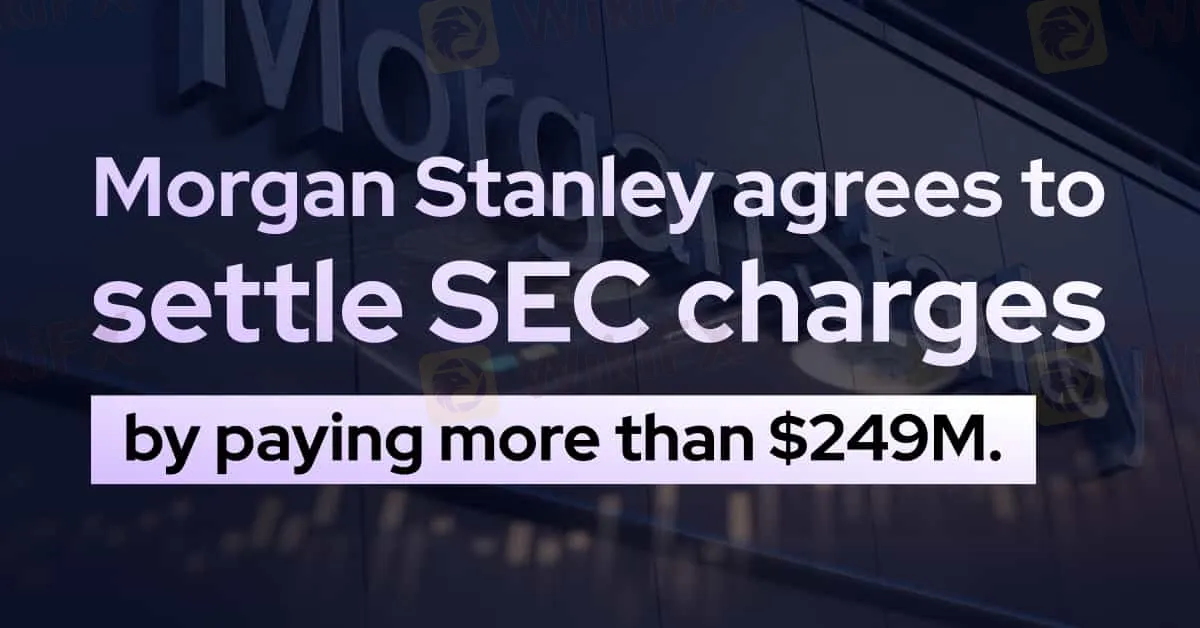简体中文
繁體中文
English
Pусский
日本語
ภาษาไทย
Tiếng Việt
Bahasa Indonesia
Español
हिन्दी
Filippiiniläinen
Français
Deutsch
Português
Türkçe
한국어
العربية
Morgan Stanley agrees to settle SEC charges by paying more than $249M.
Abstract:The Securities and Exchange Commission (SEC) recently brought charges against Morgan Stanley & Co. LLC, a leading investment banking institution, and its former head of the equity syndicate desk, Pawan Passi.

The Securities and Exchange Commission (SEC) recently brought charges against Morgan Stanley & Co. LLC, a leading investment banking institution, and its former head of the equity syndicate desk, Pawan Passi.
These charges are linked to a prolonged fraud scheme involving the improper disclosure of confidential information related to significant stock transactions known as “block trades.” Additionally, the SEC has accused Morgan Stanley of failing to adhere to policies designed to prevent the misuse of material non-public information related to block trades, which typically involve the private arrangement and execution of substantial quantities of a company's shares outside of public markets.
The SEC alleges that Morgan Stanley and Passi shared information about impending block trades with certain buy-side investors, anticipating that these investors would use the information strategically. Specifically, these investors were expected to take substantial short positions in the stock associated with the upcoming block trade. If Morgan Stanley proceeded with the block trade, these investors would then request and receive allocations from Morgan Stanley to cover their short positions, effectively mitigating the bank's risk.
The SEC's investigation, covering the period from June 2018 to August 2021, revealed that Passi and a subordinate on Morgan Stanley's equity syndicate desk disclosed non-public information about imminent block trades to specific buy-side investors. This occurred despite explicit confidentiality requests from the sellers and Morgan Stanley's internal policies governing the handling of confidential data.
Furthermore, the SEC's order highlights Morgan Stanley's failure to implement effective information barriers, preventing the transmission of material non-public information from the equity syndicate desk (located on the private side of the firm) to a trading division on the public side. This lapse hindered the firm's ability to scrutinize whether trades by the public side, conducted while discussions were ongoing with selling shareholders about potential block trades, were based on confidential information.
The SEC's order against Morgan Stanley asserts that the firm knowingly violated Sections 10(b) and 15(g) of the Securities Exchange Act of 1934, along with Rule 10b-5(b) thereunder. As a result, the SEC censured the firm and imposed financial penalties, requiring payment of approximately $138 million in disgorgement, about $28 million in prejudgment interest, and an $83 million civil penalty. In the case of Passi, the SEC's order states that he willfully violated Section 10(b) of the Exchange Act and Rule 10b-5 thereunder, leading to a $250,000 civil penalty, along with associational, penny stock, and supervisory bars.
Concurrently, the U.S. Attorneys Office for the Southern District of New York has reached criminal resolutions with Morgan Stanley and Passi. Notably, the SEC's disgorgement and prejudgment interest requirements for Morgan Stanley will be deemed partially satisfied by the firm's forfeiture and restitution of $136,531,223 as part of its criminal resolution.

Disclaimer:
The views in this article only represent the author's personal views, and do not constitute investment advice on this platform. This platform does not guarantee the accuracy, completeness and timeliness of the information in the article, and will not be liable for any loss caused by the use of or reliance on the information in the article.
Read more

Doo Financial Expands Regulatory Reach with Offshore Licenses in BVI and Cayman Islands
According to the report, Doo Group, a prominent Singapore-based online brokerage firm, has strengthened its global presence by securing new offshore licenses for its brokerage brand, Doo Financial. The company recently announced that entities under the Doo Financial umbrella have been granted licenses by two key offshore regulatory bodies: the British Virgin Islands Financial Services Commission (BVI FSC) and the Cayman Islands Monetary Authority (CIMA).

The Hidden Checklist: Five Unconventional Steps to Vet Your Broker
Forex broker scams continue to evolve, employing new tactics to appear credible and mislead unsuspecting traders. Identifying these fraudulent schemes requires vigilance and strategies beyond the usual advice. Here are five effective methods to help traders assess the legitimacy of a forex broker and avoid potential pitfalls.

Doo Financial Obtains Licenses in BVI and Cayman Islands
Doo Financial, a subsidiary of Singapore-based Doo Group, has expanded its regulatory footprint by securing new offshore licenses from the British Virgin Islands Financial Services Commission (BVI FSC) and the Cayman Islands Monetary Authority (CIMA).

CFI’s New Initiative Aims to Promote Transparency in Trading
A new programme has been launched by CFI to address the growing need for transparency and awareness in online trading. Named “Trading Transparency+: Empowering Awareness and Clarity in Trading,” the initiative seeks to combat misinformation and equip individuals with resources to evaluate whether trading aligns with their financial goals and circumstances.
WikiFX Broker
Latest News
ASIC Sues Binance Australia Derivatives for Misclassifying Retail Clients
AIMS Broker Review
The Hidden Checklist: Five Unconventional Steps to Vet Your Broker
WikiFX Review: Is FxPro Reliable?
Malaysian-Thai Fraud Syndicate Dismantled, Millions in Losses Reported
Trading frauds topped the list of scams in India- Report Reveals
YAMARKETS' Jingle Bells Christmas Offer!
Doo Financial Expands Regulatory Reach with Offshore Licenses in BVI and Cayman Islands
Why is there so much exposure against PrimeX Capital?
Russia to Fully Ban Crypto Mining in 10 Regions Starting January 1, 2025
Currency Calculator


